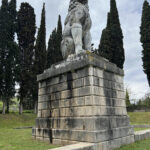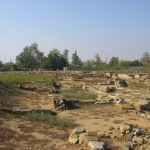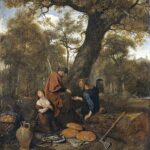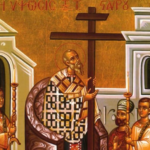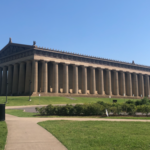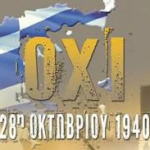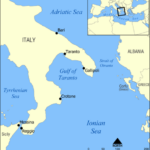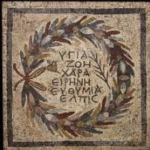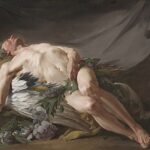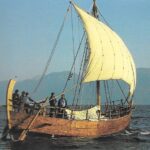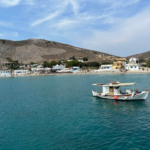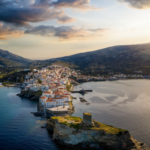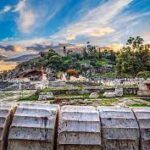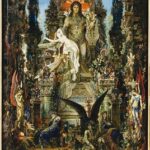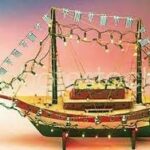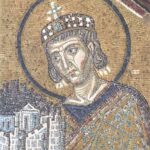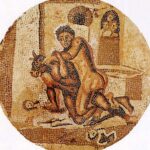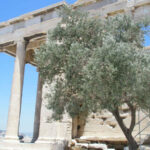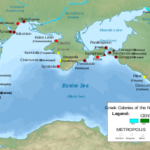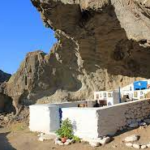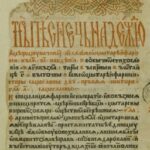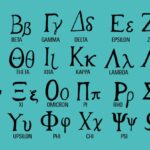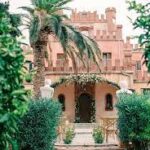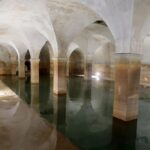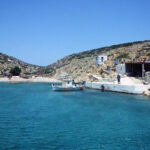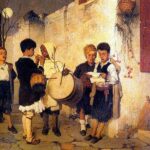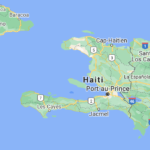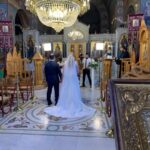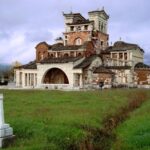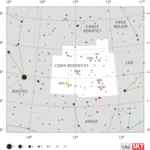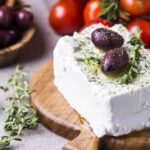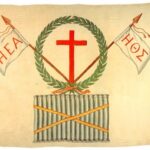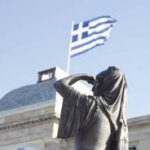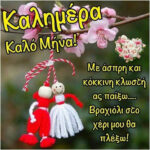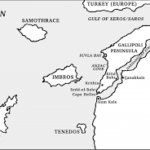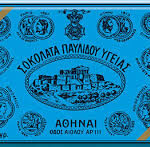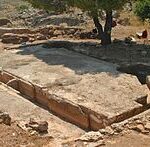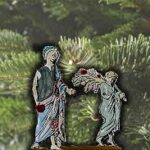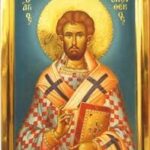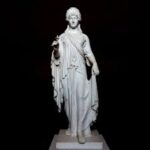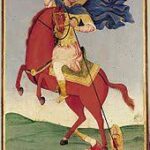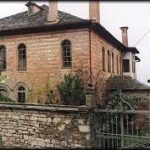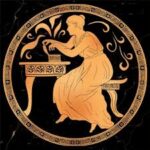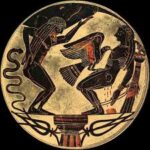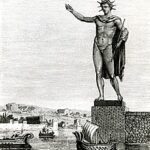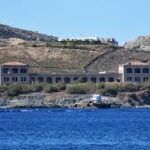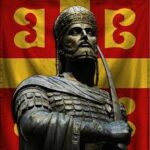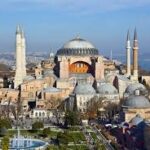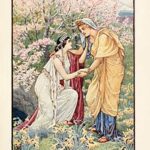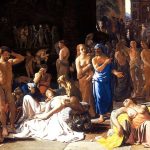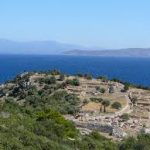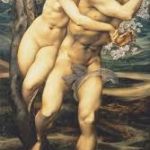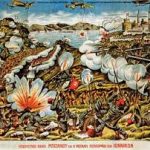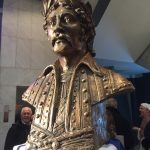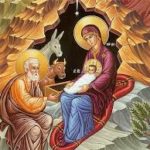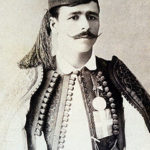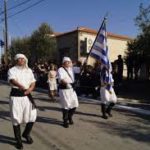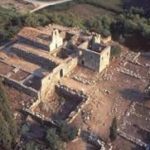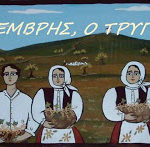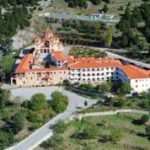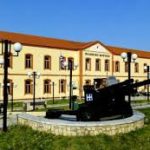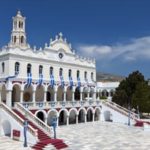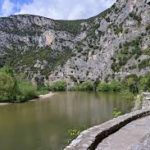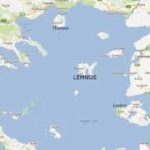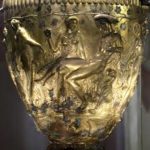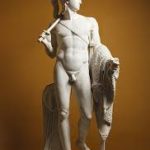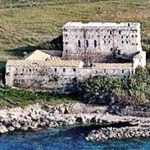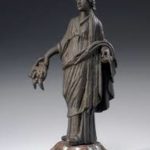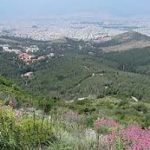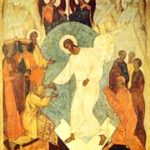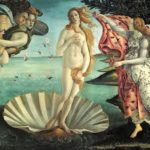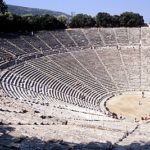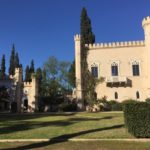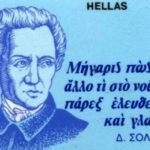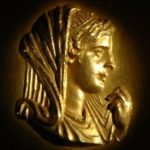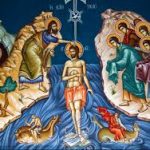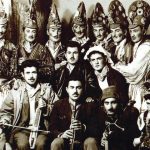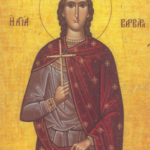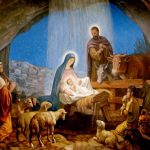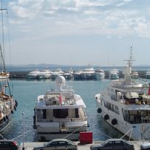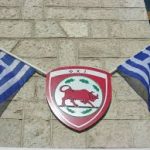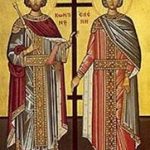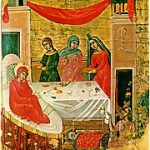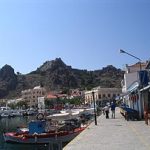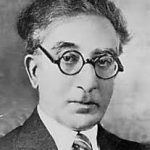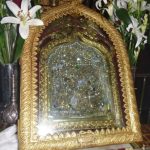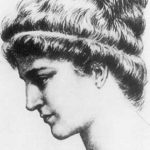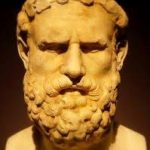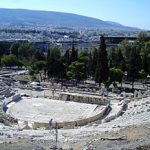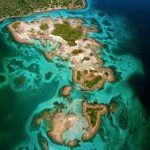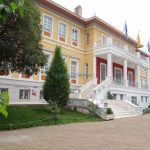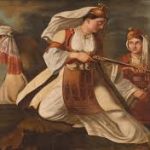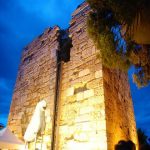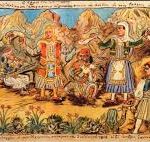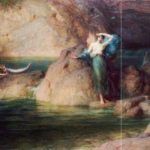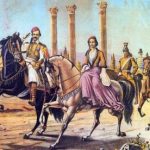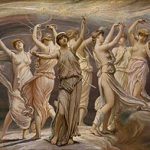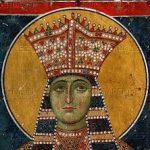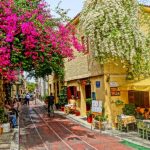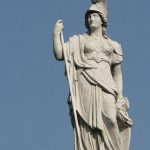The customs of Lazarus Saturday and Palm Sunday mark the end of Lent and the entrance into Holy Week. These are moments of collective memory, religious reverence, and social cohesion. Over the centuries many traditions and folk customs are associated with this feast among the people of Greece. The Saturday of Lazarus is one of […]
Read MoreGreece Through Despena's Eyes
CHAERONEA
Greece is an open museum. No matter which part of the country you visit, Ancient Greece is there to greet you. This can be seen when visiting Chaeronea (Greek: Χαιρώνεια), a once-important village in the regional unit of Boeotia, only a couple of hours outside Athens.Today, the capital of Boeotia is Levadeia and its largest […]
Read MoreThe Ancient Greek City of Abdera
The whole of Greece is an open museum and besides the well-known city states of Athens, Sparta, Argos, Mycenae, Knosos, Elefsis etc. where ancient Greek culture reached its height, there are other many cities which were just as important during this period. One such city was that of Abdera (Greek: Άβδηρα), a major Greek […]
Read MoreRELIGIOUS TRADITIONS IN GREECE
Celebrating customs and traditions is important.
Read MoreERYSICHTHON
Throughout history mankind has lived from one crisis to the next and the symbolism of myths help us to understand the figures and situations that these stories represent. The Ancient Greeks, through their myths, were able to touch on every subject that mankind deals with. They refer to the emotions of the person, his […]
Read MoreFeast of the Cross
The Feast of the Cross or the Exaltation of the Holy Cross commemorates the cross used in the crucifixion of Jesus. It is celebrated on 14 September according to the Gregorian calendar or 27 September for those that follow the Julian calendar. It is the day that the True Cross of our Lord and […]
Read MoreThe Tennessee Parthenon
If you want to see a replica of what the original Parthenon temple in Athens, Greece looked like, a visit to Centennial Park, Nashville, Tennessee, United States is the place to go. Nashville’s nickname, the ‘Athens of the South’, influenced the choice of the building as the centrepiece of the 1897 Centennial Exposition in […]
Read MoreNO DAY!! The National Day of Greece
Greece proudly celebrates OXI DAY!!, the day on which Greece became involved in World War II rather than V Day, the ending of World War II. This is due to the provocations and the hostile campaign that Italy started against Greece with the sinking of the Greek light cruiser ‘Elli’ on 15 August in […]
Read MoreINFLUENCE OF ANCIENT GREECE OVER ROMAN CULTURE
Visiting Rome, the Eternal City, is always a wonderful experience as it links the present with the past. Looking around at the historical sites of Rome recalled how closely linked the Roman Empire and its culture was with ancient Greece. The link between the two cultures stretches further back than some may realize as […]
Read MoreOLYMPIC GAMES PARIS 2024
Paris Olympic Games 2024
Read MoreLEMNOS: An Island of Mythology and History
Lemnos, an island of mythology and history.
Read MoreNEW YEAR RESOLUTIONS
New Year resolutions date back to antiquity.
Read MoreMARIA CALLAS – LA DIVA
Maria Callas - La Divine
Read MoreMORPHEUS the Ancient Greek God of Dreams
The Ancient Greek god Morpheus is the god of dreams.Therefore, the saying, 'in the arms of Morpheus.'
Read MoreGREECE – A SEAFARING COUNTRY
Greece is surrounded by sea on all sides. Her mythology is also connected with this.
Read MorePSERIMOS – A border island
Pserimos, a small border island with a long history.
Read MoreThe Greek Island of Andros
The Cycladic island of Andros.
Read MoreGREEK ORTHODOX EASTER PREPARATIONS
Greek Easter is a special time of the year.
Read MoreSEMELE: Dionysus’ Mother
Semele, Dionysus' mother.
Read MoreTHE EUGENIDES FOUNDATION
Eugenios Eugenidis Foundation
Read MoreCLEAN MONDAY AND HALVA
Clean Monday is connected to kite flying, laguna and halva.
Read MoreCHRISTMAS CELEBRATIONS IN GREECE
Christmas traditions in Greece.
Read MoreTHE BYZANTINE EMPIRE
The Byzantine Empire lasted for over 1000 years.
Read MoreARIADNE, THESEUS, and the MINOTAUR
Greek mythology relates to Zeus and the Olympian gods, their demands, and the rewards they give to those that have their favour. Although the myths contain considerable elements of fiction, they are also considered to be true accounts of the events that they describe. There is a great deal of symbolism in all the […]
Read MoreTHE OLIVE TREE
The olive tree is a very important part of Greek culture since antiquity.
Read MoreThe Month of September
The month of September had many symbolic references to the ancient Greeks that we can still see today.
Read MoreMEMORIAL SERVICE IN ANAVISSOS
1922 is the centenary of the Greek Asia Minor Catastrophe. An event that cannot be forgotten
Read MoreEDESSA and POZAR THERMAL BATHS
Visiting Odessa and the warm baths of Pozar is a must.
Read MorePALAIA PHOCAEA
The Greek refugees that came from Asia Minor and settled in Greece often named their new townships after their places of origin. This is the case of Palaia Phocaea, the ancient Greek city on the Aegean coast of today’s Turkey. They left their ancestral homes and sought refuge in Motherland Greece after the disintegration […]
Read MoreThe Greeks in the Black Sea Area.
The Greek presence in the Black Sea and in the Ukraine goes back to the Classical period of ancient Greece. They were the first to colonize the shores of this area from the 6th century BC. At first, they referred to it as inhospitable or dangerous (Greek: Αξενο) as they did not know what they […]
Read MoreTHE CHURCH PANAGIA KAKAVIOTISA
Panagia Kakaviotisa is the only cave-church not only in Lemnos, but throughout Greece. It's an enjoyable hike through the countryside and up into the hill area of Kakavo where the church has been built.
Read MoreTRIODION
Carnival time or Apokries (Greek: Απόκριες), which means to abstain from meat, begins with the Triodion (Greek: Τριώδιον). This refers to the liturgical book used by the Eastern Orthodox Church that sets out the proper way the fasting period before Easter should be carried out, including the three weeks leading up to the Lent […]
Read MoreCelebrating International Greek language Day
International Greek Language Day is celebrated on February 9 annually. It was established officially by the Greek Government in 2017 after accepting the proposal made by professor Yiannis Korinthios, a Diaspora Greek in Italy. International Greek Language Day also honours the memory of the Greek national poet Dionysios Solomos, who wrote Greece’s national anthem “Hymn […]
Read MorePAPADOPOULOS BISCUITS: Centenary Celebrations
I feel pride when I see the company I created moving forward and remaining faithful in the principles I have always tried to serve: ethics combined with legitimate ambitions” – Evangelos Papadopoulos, 1972. A hundred years have passed from the arrival of the Papadopoulos family from Constantinople to Piraeus as refugees. A hundred years […]
Read MoreTHE TOWER OF MELISSOURGOS
The interesting history of the Melissourgos Tower.
Read MoreHadrian’s Reservoir in Athens
Hadrian's Reservoir is now referred to as 'Dexameni' at the foothill of Lykavito in the suburb of Kolonaki.
Read MoreThe Remote Island of Kinaros
There are many small remote islands in Greece that we might have heard of, but have never had the chance to visit, usually because they are difficult to get to. It is necessary to go to one of the larger islands and take a boat from there to the small island. These remote islands […]
Read MoreCHRISTMAS TRADITIONS IN GREECE
Greek Christmas traditions are different in many ways. These traditions are connected with the food, sweets, gifts and carols that are sung during the festive season.
Read MoreHAITI – “Towards the Citizens of Greece”
Haiti, the first country to recognise Greek independence in 1822.
Read MoreGreek Wedding Traditions
Greek weddings follow certain traditions that are not found in other countries.
Read MoreOTHONOI – THE ISLAND OF CALYSPO
The Diapontian Island of Othonoi is connected with the myth of Calypso and Odysseus.
Read MoreAGIA FOTINI OF MANTINEIA
A visit to the unique church of Agia Fotini outside Tripoli in Arcadia is an unforgettable experience.
Read MoreThe Horses of Achilles
'The Horses of Achilles', a poem by Angelos Sikelianos.
Read MoreThe Heritage of Angelos Sikelianos
The interesting life of Greek poet Angelos Sikelianos and his wife Eva Palmer and the revival of the Delphic Festival.
Read MoreCOMA BERENICE
The story behind the constellation Coma Berenice goes back to antiquity and Queen Berenice.
Read MoreGreek Feta Cheese
Greek Feta cheese was officially recognized as a ‘Protected Designation of Origin’ (P.D.O.) product by the European Union Commission in 2002. Recognizing the uniqueness of such a product is very important as Greek Feta cheese is completely different to any of the ‘feta’ cheeses made not only in other European countries, but in countries […]
Read MoreLord Byron’s Last Poem
Lord Byron wrote his last poem a few month before his 36th birthday and his death at Messolonghi, Greece. Greece has honoured him by celebrating 'Byron Day' on 19 April.
Read MoreLORD BYRON: The Philhellene Poet
Lord Byron is one of the best-known philhellenes during the Greek War of Independence against Ottoman rule.
Read MoreWomen Members of the Filiki Eteria
A number of women became members of Filiki Eteria, the secret society that helped in the Greek Revolution of 1821 against Ottoman rule.
Read MoreHYPNOS AND THANATOS
Hypnos and Thanatos may have been minor gods in ancient Greek mythology, but they were respected by mortals and immortals alike.
Read MoreBICENTENARY CELEBRATIONS IN GREECE
Women in the Bicentenary Celebrations in Greece.
Read MoreMarch Traditions
March traditions in Greece are an interesting part of every day life, especially in the country areas.
Read MoreLemnos – Imbros – Hellespontos
The history and the mythology connected with the islands of the north Aegean such as Lemnos and Imbros go back to antiquity. Lemnos was freed from Ottoman rule and became a part of the Greek State on 8 October 1912, during the First Balkan War. However, Imbros, which was a Greek island from antiquity, […]
Read MoreDid you know? Pavlidis Chocolates
There is always a story behind the people and the company they set up and how it develops over time. In Greece it began when Spyridon Pavlidi opened his pastry shop in 1842 at the intersection of Vissis and Aeolou Street in Athens, in the heart of the Athenian shopping area of the time, […]
Read MoreIOANNIS KAPODISTRIAS – A Symbolic Figure
Much can be said about the life and career of Ioannis Kapodistrias (Greek: Ιωάννης Καποδιστριας). He was the Foreign Affairs Minister for Alexander I of Russia during the most important part of European history as it was straight after the Napoleonic Wars (1803-1815). And most important of all, he was the first Governor of […]
Read MoreSALEP
The salep, which is made from the tubers of the orchid family Orchis mascula, has been used from antiquity for the toning of the immune system of patients during their convalescence. Orchis comes from the Ancient Greek word meaning testicles because of the appearance of the two tubers that form the roots of the […]
Read MoreThe Silver Mines of Lavrion
There are many historical areas that can be easily visited on the outskirts of Athens. Lavrion (Greek: Λαύριον) is one such area. It is situated on the eastern coast of Attica and its importance from ancient times up to now is in the lead and silver mines found in the rugged hillside area of […]
Read MoreGREEK CHRISTMAS TRADITIONS
Greece has many Christmas traditions that often go back to antiquity. One such tradition is the decoration of the Christmas tree. Although decorating a Christmas tree was introduced by King Otto, the first king of Greece in 1833, the tradition already existed in ancient Greece. This was the tradition of the Eiresione (Greek: Ειρεσιώνη). […]
Read MoreDecember Feast Day: Agios Eleftherios
There are many Feast Days in December in the Greek Orthodox Church leading up to Christmas. One such Feast Day is that of Agios Eleftherios (Greek: Άγιος Ελευθέριος), whose Feast Day is on December 15. He is the patron saint of expectant mothers and childbirth as his name suggests. Eleftherios means one who is free. […]
Read MoreThe Goddess Hope
From the poem Works and Days by Hesiod referring to Hope. Only Hope was left within her unbreakable house, She remained under the lip of the jar, and did not Fly away. Before [she could], Pandora replaced the Lid of the jar. This was the will of aegis-bearing Zeus the Cloudgatherer. Hesiod, an […]
Read MoreHAGIOS DEMETRIOS of THESSALONIKI
Hagios Demetrios of Thessaloniki (Greek: Άγιος Δημήτριος της Θεσσαλονίκης) is also known as the Holy Great Martyr Demetrios the Myroblyte (the Myrrh-Gusher). He is the patron saint of Thessaloniki, which is celebrated on 26th October, the date of his death in 306 AD. Demetrius was born to pious Christian parents of aristocratic background in […]
Read MoreTHE ATHONIAS SCHOOL
On Mount Athos or the Holy Mountain (Greek: Άγιο Όρος) many schools operated over various periods. However, in 1749 the Athonias School or the Athonias Ecclesiastical Academy was established. It became the centre of The Greek Enlightenment during the 18th century, offering high level education in ancient philosophy and modern physical science. The Athonias […]
Read MorePANDORA AND HER BOX
Hephaestus, the Olympian god of fire, metallurgy, craftsmanship, artisans, sculptors and volcanoes was asked by his father Zeus, king of the Olympian gods, to make the first woman. It was an easy task for him as he was the god of so many trades. He made her out of soil and water. She was […]
Read MoreEPIMETHEUS & PROMETHEUS
Once upon a time, our world was completely different. Civilisation as we know it today did not exist. It was a time when people still lived in caves, in darkness with only the bare essentials, if that. And every day, in order to survive they would have to go out and hunt for food, gather […]
Read MoreThe Colossus of Rhodes
The island of Rhodes (Greek: Ρόδος) is the largest of the Dodecanese islands (Greek: Δωδεκάνησα) of Greece in the South Aegean. The township of Rhodes is also the capital city, the name coming from the ancient Greek ‘Rhodon’ (rose). The island was inhabited from the Neolithic period, going back 12,000 years ago. The Minoans […]
Read MoreSYROS – LAZZARETTO QUARANTINE STATION
The island of Syros (Greek: Σύρος) is referred to as the jewel of the Cyclades. This is understandable when you see the panoramic view that it offers from the hilltop overlooking the township towards the harbour, the Aegean Sea and the neighbouring islands of Tinos, Delos, Mykonos, Poros, Andros and Naxos. They are some […]
Read MoreEmperor Constantine XI Dragases Palaiologos: The Marble King
The Byzantine Empire had 94 Emperors over a span of 1123 years from 330 to 1453 AD when Constantinople fell to the Ottoman Sultan Mehmed II. The last emperor was fated to be Constantine XI Dragases Palaiologos (Greek: Κωνσταντίνος ΙΑ Δραγάσης Παλαιολόγος). He was born on 8 February 1405, the fourth son of Emperor […]
Read MoreHAGIA SOPHIA – A Tribute to Christianity
Hagia Sophia (Greek: Αγία Σοφία) or the Church of Holy Wisdom in Constantinople, today’s Istanbul in Turkey was the centre of Christianity for over a thousand years from its construction in 532-537 AD to the fall of the Byzantine Empire on 29 May 1453 to Sultan Mehmed II. It also effectively marked the end […]
Read MorePrincess Alice of Battenberg
We are often intrigued by the lives of royalty. We remember many of them for the tumultuous lives they lead or for the heritage that they leave behind. One such royal was Princess Alice of Battenberg, born in Windsor Castle on 25 February 1885. Her father was Prince Louise of Battenberg and her mother […]
Read MorePHOBOS – Son of Ares
Fear is inherent in every person. It is a disturbing feeling that has a hold over a person because of an impending danger the courses of which we often do not know. We can all understand that behind a dark and rainy night, behind thunder and lightning and other unknown circumstances is hidden the […]
Read MoreThe Mastic Tree of Chios
Chios (Greek: Χίος) is the fifth largest of the Greek islands in the Aegean Sea separated from Turkey by the Chios Strait. It is also referred to as “the Mastic Island” as it is the sole global producer of the prized mastic or “tears of Chios”. The mastic tree (Greek: μαστίχα), derived from the Latin […]
Read MoreMAY – The Last Month of Spring
There are many traditions connected with May, the fifth month of the year and the last month of spring. The first of May (Greek: Πρωτομαγιά – Protomagia) was celebrated long before it became connected with the worker’s movement, which honours the bloody workers’ uprising in Chicago in 1886. Besides the celebrating of May Day, […]
Read MoreTHE GREAT PLAGUE OF ATHENS
Plagues have often made their appearance throughout the history of Man, killing thousands of people and changing the course of history. One such plague was the Great Plague of Athens in 430 BC (Greek: Λοιμός των Αθηνών), a plague that claimed between 70,000 – 100,000 Athenian lives, approximately a third of the population. The […]
Read MoreANCIENT RHAMNOUS
There are so many ancient sites around Athens that we do not know about. One of them is the ancient site of Rhamnous (Greek: Ραμνούς), on the Attica coast about 55 km northeast of Athens. The ruins are found outside the town of Agia Marina in the Municipality of Marathon, the area in which […]
Read MoreThe Myth of the Almond Tree
There lived in Thrace a beautiful princess. Her name was Phyllis (Greek: Φυλλίς) daughter of the Thracian king Sithon (Greek: Σιθων). She fell in love with Demophon (Greek: Δημοφώντας), son of Theseus, the mythical king and founder-hero of Athens. Demophon fought in the Trojan War and was one of the 30 or 40 soldiers […]
Read MoreCELEBRATIONS AND FOOD
Many celebrations are associated with food. In the case of Greek Independence Day on 25th March, the custom is to eat salted cod fish along with a garlic potato dip. But why cod (Greek: μπακαλιάρος)? Cod arrived in Greece during the 15th century. The reason as to why it was established as the customary dish […]
Read MoreThe 107th ANNIVERSARY OF THE FREEING OF IOANNINA
The 107th anniversary of the Freeing of Ioannina and its incorporation as part of the Greek State is being celebrated this year, 2020. The battle for the freedom of Ioannina was a very symbolic military action for the newly founded Greek State against the Ottoman Empire on the Epiros front during the First Balkan War […]
Read MoreHONOURING IOANNIS GIANNOPOULOS
A special function was organised at the Apostolopoulou Cultural Centre of the Municipality of Tripoli Arcadia to honour a prominent Greek of the Diaspora, Ioannis Giannopoulos, who was born in Arcadia, Morea. He is honoured because he left his mark on the educational history of America when he established the first school in the […]
Read MoreNEW YEAR TRADITIONS
There are many traditions with the coming of the New Year (Greek: Πρωτοχρονιά) in Greece that go back to antiquity. Some of these are the singing of the New Year carols (Greek: κάλαντα), the cutting of the Vasilopita or St Basil’s cake, the hanging of a Squill Bulb or Onion on the front door and […]
Read MoreCELEBRATING CHRISTMAS
The festive season of Christmas (Greek: Χριστούγεννα) is a time of celebrating life and the giving of gifts. It celebrates the birth of Jesus Christ, the Saviour of Man, the bringing of peace and love to the hearts of the people. According to the gospels of Luke and Matthew, Jesus was born in Bethlehem, […]
Read MoreSPIRO LOUIS AND HIS TROPHIES
Spiro Louis was the winner of the Marathon race in the first modern Olympic Games that were held in Athens Greece from 6-15 April 1896. It was a vision that became a reality for the French philhellene, Pierre de Coubertin, the creator of the International Olympic Committee (IOC). When Spiro Louis (Greek: Σπυρίδων – […]
Read MoreSOPHIA VEMBO – the Singer of Victory
The participation of Greece in the Second World War (1939-1945) began with a resounding ‘NO!’ – ‘ΟΧΙ!’ in the early morning hours of 28 October 1940 by the Greek Prime Minister Ioannis Metaxas to the Fascist Dictator of Italy, Bettino Mousoulini, who demanded that Greece allow the Italian troops to occupy certain parts of […]
Read MoreTHE LIBERATION OF LEMNOS FROM OTTOMAN RULE
The liberating of Lemnos after 456 years of Ottoman oppression is connected with Rear Admiral Kountouriotis and the flagship Averof. On 6th October 1912 the Greek battleships led by the flagship Averof arrived at the port of Moudros, on the east side of the island of Lemnos in the north Aegean. Rear Admiral […]
Read MoreANAVISSOS – ANCIENT ANAPHLISTO
On Saturday 21 September 2019, the private Museum of Asia Minor Culture, created by Chrisostomou – Maky Agkoutoglou in the family home in Anavissos, Attiki, organised a series of events as part of the Summer Festival of Dimo Saronikou. It was the third year in succession that this annual function was organised under the […]
Read MoreSANCTUARIES IN ANCIENT GREECE
The most famous sanctuaries in ancient Greece that foretold the future were those of Dodoni, Delphi and Acheronda. However, there are certain differences between them. With the first two, the pilgrim asked the priest for his prophecy, whereas with Acheronda, the pilgrim comes in contact with the souls of the dead. He comes in […]
Read MoreTHE NECROMANTEION OF ACHERON
Visiting historical places or places that you have read about in mythology is a magical experience. It takes you back in time and makes you wonder about the lifestyle of the people of that period. Such a visit was to the Necromanteion of Acheron, or the Oracle of the Dead, the Sanctuary of Hades […]
Read MoreSEPTEMBER – the beginning of Autumn
Each month of the year is special. They mark the passing of the seasons, which in turn relate to certain celebrations and traditions that have a special meaning for each and every one of us. Therefore, the month of September highlights the end of summer and the beginning of autumn in the northern hemisphere. […]
Read MoreTHE MONASTERY OF ST NICHOLAS KALTEZON
Greece is full of monasteries, some of which are very well known and very historical. Most of them date back to the Byzantium period. One such monastery is the Monastery of St Nicholas outside the village of Kaltezes (Greek: Μονή Αγίου Νικολάου Καλτεζών). It is only 30 km from Tripoli on the road to […]
Read MoreFANOUROPITA – THE LOST AND FOUND CAKE
The Greek Orthodox Church has many Feast Days throughout the year with the people celebrating their name on that particular day. In Greece, Name Days are usually more important than birthdays and friends and relatives visit or phone to wish the person Hronia Pola, meaning Happy Name Day, Many years of health and happiness. There […]
Read MoreTHE WAR MUSEUM OF THESSALONIKI
Visiting Thessaloniki is always an interesting experience. I usually start off with the Cultural Bus Route that takes you around the historical and cultural points of interest as you can get on and off wherever your fancy takes you. There are a number of museums on the bus route such as the Archaeological Museum and […]
Read MoreAUGUST
August (Greek: Αύγουστος) is the eighth month of the year and the last month of summer. In the ancient Greek Attica calendar, it was divided into two periods – the Metageitnion (Greek: Μεταγειτνιών – mid July to mid August), and Boedromion (Greek: Βοηδρομιών – mid-August to mid September). The calendar basically set the dates for […]
Read MoreThe Rotunda of Thessaloniki
Besides the many Early Christian and Byzantine Monuments such as the Church of Agios Dimitrios (patron saint and protector of Thessaloniki dating back to 5th century AD), the Church of Agia Sofia (built in the early 7th century on the site of an older temple), the Monastery of Vlatadon dating back to the 14th century, […]
Read MoreNESTOS RIVER TRAILS
Many new trekking trails are opening up throughout Greece for those that are interested in nature and the environment as well as the historical significance of these areas. Some of these trails are close to the cities such as the Ancient Sphettia Way connecting the area of Koropi with Athens. Others are further afield. […]
Read MoreJASON AND THE ISLAND OF LEMNOS
In order for Jason (Greek: Ιάσων) to claim his right to the throne of Iolcus in Thessaly, from his uncle Pelias, who had usurped it from his father, Aeson, he had to bring back the Golden Fleece (Greek: Χρυσόμαλλον δέρας) from the area of Colchis on the Black Sea. Jason took up the challenge […]
Read MoreDERVENI KRATER
Museums are a treasure-trove of wonder and the Museums of Greece even more so. While in Thessaloniki, I visited the Archaeological Museum for the umpteenth time and again marvelled at the detail of so many of the exhibits: works of art that continue to amaze the visitor no matter how many times they are viewed. […]
Read MoreJASON AND THE ARGONAUTS
The heroes in Ancient Greek mythology had a distinguished place in the tales, traditions, poetry and literature of the people as they had the special powers and superhuman talents that the ordinary person did not have. These special people were endowed with beauty, physical strength and special qualities. The word hero in ancient Greece did […]
Read MoreThe Islands of Strofades
Strofades (Greek: Στροφάδες) are two very small Greek islands in the Ionian Sea 27 miles south of the island of Zakynthos and 28 miles to the west of the Peloponnese. The larger of the two islands is named Stamfani and the smaller one Arpia. The islands were also called Floating (Greek: Πλωτές – Plotes) […]
Read MoreMAIA – goddess of birth
Mythology played an important part in ancient Greek society as it attempted to explain the creation of mankind and how the world began. Ancient Greek mythology is made up of gods, demigods and supernatural beings that are closely linked to religion or spirituality and the establishment of certain feasts that celebrate these phenomena. Besides the […]
Read MoreTHE MONTH OF MAY
The month of May is not only a month of nature’s rebirth and the making of May Day wreaths. It is also a month that represents the struggle of the workers around the world for better working conditions, better pay as well as health and pension coverage. It is a month of many significant celebrations […]
Read MoreHymettus and the Ancient Sphettia Way
The landmark of Athens is of course the Acropolis on which the Parthenon, the temple dedicated to the goddess Athena and patron of Athens, is found. However, there are many ‘hidden’ areas all around Athens that even many locals are not aware of let alone the visitors. One such area is the Hymettus […]
Read MoreGREEK ORTHODOX EASTER – PASCHA
Easter (Greek: Πάσχα) is the celebration of the resurrection of Jesus Christ from the dead. The Greek Orthodox Church and all the Christian Churches around the world celebrate the resurrection of Jesus described as having occurred on the third day after his burial when he was crucified by the Romans at Calvary around 30 […]
Read MoreAPHRODITE – the ancient Greek goddess
Aphrodite (Greek: Αφροδίτη) is the ancient Greek goddess of love, beauty, passion, pleasure and procreation. Hesiod (Greek: Ησίοδος), an ancient Greek poet, refers to Afrodite as the foam-born goddess in his Theogony, a poem describing the origins of the Greek gods. It was composed around 700 BC. She was born off the coast of […]
Read MoreEPIDAURUS THEATRE
The warm evenings of the Greek summer are ideal for attending the open air theatres where the works of the great ancient Greek playwrights such as Aeschylus, Euripedes, Sophocles and Aristophanes come alive. The Epidaurus Festival, which has been organized as an annual event since 1955, is the cultural highlight of the summer season. […]
Read MoreTHE QUEEN’S TOWER
Tucked away in a quiet corner in the suburb of Ilion (Greek: ΄Ηλιον) in the west of Athens, a stone’s throw away from Syntagma Square is the former estate of Queen Amalia of Greece. In it is the neogothic castle that she had built along the lines of the Hochenschawangau castle in Bavaria where her […]
Read MoreCELEBRATING INTERNATIONAL GREEK LANGUAGE DAY
In its press release regarding the 2019 International Greek Language Day celebrations, the Ministry of Education writes: “It is important to learn and love the Greek language, because of its virtues but mainly because it has expressed a great culture, that shaped and codified the first and statutory layer of the upper vocabulary and the […]
Read MoreTHESSALONIKI – the Legend of a Mermaid
Mermaids are connected with the sea and the fact that the city of Thessaloniki is on the coast ties in very well with the naming of it. Thessalonike was born on the day of the decisive battle of the Crocus Field (Greek: Μάχη του Κροκίου Πεδίου) in 352 BC. Her father, King Phillip II of […]
Read MoreEPIPHANY – The Twelfth Day of Christmas
Epiphany, from the Greek word επιφάνεια, which means manifestation, to appear, completes the Christmas – New Year celebrations. It is the day when Jesus, at the age of 30, was baptized in the River Jordan by John the Baptist. From that day he began preaching the word of God to the people in the […]
Read MoreChristmas – New Year Traditions
Throughout Greece there are many traditions and customs to celebrate the Twelve Days of Christmas. There are many similarities in these celebrations, but just as many differences. However, the main idea in all these celebrations is the passing of the old and the coming of the new; the re-birth of nature and wishes for health, […]
Read MoreMELOMAKARONA – A TRADITIONAL GREEK CHRISTMAS SWEET
Melomakarona!! A traditional Greek Christmas sweet that drips with honey as the name implies, sprinkled with ground walnuts mixed with cinnamon and cloves. Meli means honey and makaron is a type of pasta dough. It comes from the ancient Greek word makaria. In ancient Greece, they would serve the makaria after a funeral service […]
Read MoreTRADITIONAL GREEK CHRISTMAS SWEETS
Kourambiedes are traditional Greek sweets that are made at Christmas. They are a shortbread biscuit that is covered with icing sugar. The icing sugar that covers them reminds you of the snow that falls during winter when Christmas and New Year are celebrated. It is said that this shortbread sweet originated in Persia. During […]
Read MoreSAINT BARBARA and Greek Traditions
Saint Barbara (Greek: Αγία Βαρβάρα) celebrates her Name Day or Feast Day on 4th December. She is considered to be a protector of children as well as the patron Saint of the Greek and Cypriot Artillery. In the past, it marked the beginning of winter and the end of the work done on the […]
Read MoreCHRISTMAS in GREECE
Christmas is the time of year that everyone looks forward to. It’s a time of giving and family gatherings. It marks the end of another year and the beginning of a new one. The birth of Jesus Christ gives people the feeling of hope and renewal. It is like the shining star over Bethlehem […]
Read MoreMARINA ZEA
The name Zea comes from the name of the ‘golden’ grain, which Homer frequently refers to in his ‘Odyssey’. Even the Egyptians considered the grain Zea superior to the grains of wheat and barley. It is the oldest type of cereal with very high nutritious value. Zea is also the name of one of […]
Read MoreAERAA!!!
The treacherous snow-capped Pindus Mountains of Epirus resounded to the cry of Aeraa!!! (Greek: Αέραα!!) as the Greek army attacked the Italian forces invading Greece on 28 October 1940, at the beginning of the Second World War. The war cry became a symbol of resistance and courage during the battle against the Italian invaders. […]
Read MoreCelebrating ‘OXI’ Day, 28 October
Each year, Greece celebrates ‘OXI’ Day, which commemorates the entry of Greece into the Second World War against the Axis powers, which were Germany, Italy and Bulgaria in Europe and Japan in Asia. It commemorates the rejection by the Prime Minister of Greece to the Italian demands that they be allowed to occupy certain […]
Read MoreSAINT CONSTANTINE and SAINT HELEN
Another very important Feast Day that is celebrated in Greece is that of the Feast of the Holy Cross on September 14. It commemorates the cross used in the crucifixion of Jesus Christ. Saint Helen, and through her, her son, Saint Constantine, are directly connected with the finding of the True Cross and therefore […]
Read More14 SEPTEMBER – Greek Traditions for the Feast of the Holy Cross
Tradition has it that the basil plant (Greek: βασιλικός) showed the true cross to Saint Helen. It was growing on the spot where Christ was crucified and where the drops of his blood fell. As there were three crosses (the other two belonged to the thieves) the smell of the basil showed Saint Helen which […]
Read MoreSEPTEMBER – the first month of autumn
September is the ninth month of the year. In the northern hemisphere it is the beginning of autumn (Greek: φθινόπωρο) and the opposite in the southern hemisphere where spring ‘is in the air’. It is also the beginning of the ecclesiastical year in the Eastern Orthodox Church as well as the start of the […]
Read MoreSEPTEMBER – religious celebrations
September is the beginning of Autumn or Fall (Greek: Φθινόπωρο) in the northern hemisphere, and the beginning of spring (Greek: Άνοιξη) in the southern hemisphere. However, it was also the beginning of the new civil year in Constantinople during the Byzantine period. It was during the Byzantine period that Christianity took root, although the schism […]
Read MoreTHE ISLAND OF LEMNOS
The Greek island of Lemnos or Limnos (Greek: Λήμνος) is found in the northern part of the Aegean Sea opposite the Dardenelles, close to the island of Agios Efstratios and in the Prefecture of Lesvos. It is the eighth largest island. In order of size the islands are: Crete, Euboea, Lesbos, Rhodes, Chios, Cephalonia, […]
Read MoreCONSTANTINE PETROU CAVAFIS – POET
Poetry is an expression of feelings, imagination, thoughts, experiences and knowledge that a person acquires. The difference between one poet and another is the way in which this is expressed, through the images that arise with the use of words and the metaphors that are used. The reader’s senses come alive and he is able […]
Read More15th AUGUST – celebrating the Dormition of Virgin Mary
August is not only the holiday month for Greece, it is also the month with one of the most celebrated religious events: the celebration of the Assumption or Dormition of the Virgin Mary (Greek: Κοίμηση της Θεοτόκου – the falling asleep of the Holy Mother), which is the taking of the Virgin Mary into Heaven […]
Read MoreHYPATIA – a remarkable woman
Although we often talk about the achievements and the greatness of men, we do not talk about the achievements and the legacy that is left behind by amazing women. One such remarkable woman was Hypatia: mathematician, astrologer and philosopher. Hypatia was the daughter of the Greek mathematician, Theon Alexandricus. She was born in […]
Read MoreDIAGORAS OF RHODES
The tomb of Diagoras of Rhodes (Greek: Διαγόρας ο Ρόδιος), the Greek Olympic winner, was found in the area of Turgut, Turkey, near the coastal city of Marmaris. The tomb dates to 3rd century BC. Up to now the Turks thought that the tomb belonged to a Muslim saint and would take offerings there. […]
Read MoreCULTURAL CORNER – THEATRE OF DIONYSUS
Present-day remains of the Theatre of Dionysus Eleuthereus, Athens Continuing on from the previous article on Tripodon Street, which leads to the Theatre of Dionysus and was marked by the tripods to honour the winner of the competition for the best play and music that marked the celebrations for the Dionysian Festival in […]
Read MoreTHE ISLAND OF EUBOEA
Recently I went on a trip to the northern part of Euboea, one of the largest islands of Greece, and only a couple of hours north of Athens. I had visited Euboea on a number of occasions, but had never visited the northern mountainous part of the island. We drove through tree-covered roads and […]
Read MoreTRIPOLI – Το «Ιερόν Μανδήλιον» – The Holy Mandylion
The Apostolopouleio Cultural Centre in Tripoli is hosting an impressive and unique exhibition of rare Russian icons from the private collection of Dimitri Talagani. The icons date between 17th and 19th century AD. The exhibition is named ‘The Holy Mandylion’ as it refers to the image of Jesus Christ on the cloth he used to […]
Read MoreNIKOS KAVVADIAS – POET
Nikos Kavvadias was born in January 1910 in Harbin, Manchuria, where his father, who had been living in Russia, had gone on business. His parents came from the Ionian island of Cefalonia, where they returned to for a few years when Nikos Kavvadias was seven years old. They moved to Pireaus in 1921. As […]
Read MoreANDREAS EMBERICOS – POET
There are many well-known Greek poets. One of them is Andreas Embericos from the island of Andros. His family are international ship owners and shipbuilders. He was born in Rumania on 20th August 1901 and died in Athens on 5th August 1975. He came to Athens as an infant. He worked in the London […]
Read MoreMAY CELEBRATIONS and TRADITIONS
The month of May took its name from the Greek goddess Maia (Greek: Μαία, meaning midwife). She is the goddess of fertility and birth. May is also connected to the goddess of agriculture, Demeter (Greek: Δήμητρα) and her daughter Persephone (Greek: Περσεφόνη). When Hades abducted Persephone and took her to the Underworld, the seasons halted […]
Read MoreSISYPHUS
Sisyphus was the son of Aiolou (Greek: Αιόλου, god of the winds) and Enarety (Greek: Εναρέτη, daughter of Deimachus, ambassador of the Seleucid Empire in India) and the founder and first king of Corinth. For some, he was the cleverest and for others the slyest person at that time. However, his name can also […]
Read MoreMANTO MAVROGENOS
The month of March celebrated two very important events – that of International Woman’s Day on 8th March and the official beginning of the Greek War of Independence on 25th March. I therefore thought that I would refer to a famous Greek woman to honour both celebrations. The woman is Manto Mavrogenous (Greek: Μαντώ […]
Read MoreThebes
Thebes (Greek: Θήβα) is a township of central Greece in the prefecture of Boeotia (Greek: Βοιοτία). It is situated on a plain between Lake Yliki to the north and the Cithaeron Mountains, which divide Boeotia from Attica to the south. Its history stretches from the Stone Age period (c.5000 BC) through to when the […]
Read MoreSeptember in Greece
September is a very important month in the calendar starting from the ancient Greeks, through to the Romans and the beginning of Christianity. It symbolizes the changes in the seasons, with September being the start of autumn followed by winter where the earth turns cold and things come to a standstill to be followed […]
Read MoreMARIA CALLAS – A WOMAN OF PASSION
Anna Sophia Maria Cecelia Kalogeropoulos, later known as Maria Callas, was born in New York on 3 December, 1923. She had an unhappy childhood due to the squabbles between her parents and the jealousy she felt towards her older sister, Jackie. Jackie was attractive and favoured by her parents whereas Maria was seen as […]
Read MoreThe Island of Salamis
The naval battle at the Straits of Salamis on 22 September 480 BC between the allies of the Greek States and the Persian Empire has gone down in history as one of the most important sea battles. It marked the end of the second Persian invasion of Greece. It also showed how one man, […]
Read MoreDance of Zalongo
March is a month with very significant celebrations for the Greek people. Besides marking the beginning of spring, March 8 celebrates International Woman’s Day. Also, March 25, 1821, marks the culmination of the struggle for independence against the Ottoman yoke – a period of over 400 years. I would therefore like to connect the […]
Read MoreMarch
March is the third month of the year in the Gregorian Calendar. In the Roman Calendar it was the first month of the year as it was the first month of spring. It was named after Mars, the God of War. In the Attica Calendar, it was named Elaphebolion (Greek: Ελαφηβολιών) and was dedicated to […]
Read MoreGreek Mythology – Alkyonides
The ancient Greeks used mythology as a means of explaining the natural phenomenon that took place around them. This is true of the warm weather that we experience at about mid January of each year. This period is known as the Halcyon Days or Alkyonides (Greek: Αλκυονίδες). The love and commitment that is seen in this […]
Read MoreTHE MUSEUM OF THE CITY OF ATHENS
THE MUSEUM OF THE CITY OF ATHENS – VOUROS EUTAXIAS FOUNDATION The Museum of the City of Athens is situated in Klafthmonos Square. It is housed in two buildings: the first was built in 1833 and the second in 1859. They both belong to the Vouros-Eutaxias family. The first king of Greece, King Otto […]
Read MoreThe Pleiades
The Pleiades (1885) by the American Symbolist painter Elihu Vedder Looking up into the sky on a clear night, various constellations and star clusters can be seen by the naked eye. One such cluster in the Northern Hemisphere is the Pleiades cluster in the constellation of Taurus. Besides the importance of these stars in Greek […]
Read MoreThe Last Byzantine Empress
A Wonderful Woman from the Past The Last Byzantine Empress – Anna Notara Palaiologo From the ancient Greek colonies in the Black Sea area, I thought that I would now take you to another area and another era – from the fall of Byzantium Constantinople in 1453 to Medieval Venice as well as Siena and […]
Read MoreTSIKNOPEMPTI
Tsiknopempti (Greek: Τσικνοπέμπτη), literally means ‘Smelly Thursday’ or ‘Charred, Smoky or Barbeque Thursday’ because of the smell of grilled meat. It is a compound word from the Greek word ‘tsikna’, which is the smell of roasting meat, and ‘Pempti’, which means ‘Thursday’. It is part of the celebrations for Carnival (Greek: Αποκριά – ‘abstaining from […]
Read MoreTRIPODON STREET in PLAKA ATHENS
Tripodon Street is the most ancient street in Athens. It has retained its name for over 2500 years. It has been recorded in the Greek record book Guinness as the oldest street. The Athenians would walk along the 800 metre length and 6 metre width street to reach the theatre of Dionysos, which held 17,000 […]
Read MoreTHE CITY OF ATHENS and the GODDESS ATHENA
Visiting the capital city of a country is a must. It is the gateway to its past and present as well as showing what its future might hold. The city of Athens is steeped in history and this history has influenced and continues to influence the rest of the world. As my grandson said when […]
Read More
